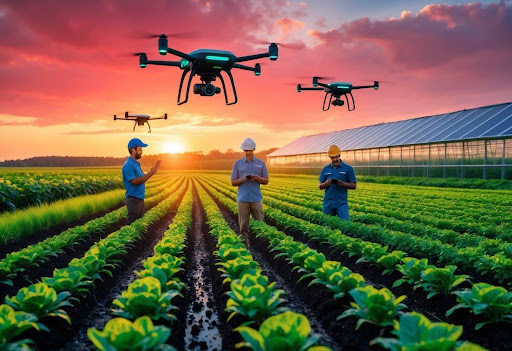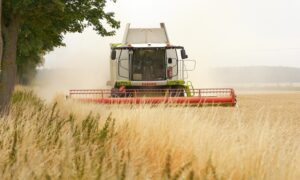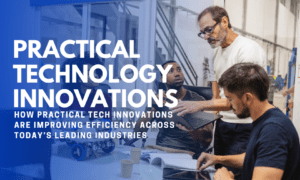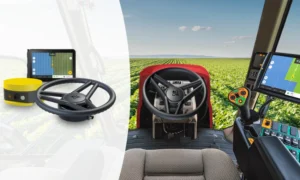According to the World Economic Forum, approximately 65% of consumers want to live healthier lives and make more sustainable choices. Rising costs and a growing awareness of the effects of climate change have led to a new era of agricultural innovation, blending technological advances with conventional farming methods.
These innovations are crucial for facing global food security challenges, which include a growing population, climate change, water shortages, and the increasing costs of essential fertilizers.
Fueling Modern Farming with Eco-Friendly Fertilizers
Without the essential nutrients provided by fertilizers, it would be impossible for farmers to feed billions of people across the globe every day. These nutrients not only increase crop yields, but they also improve the quality and shelf life by maintaining soil health, improving crop resilience, and mitigating climate change.
With modern technology and research, fertilizers and their application have evolved to become more efficient than ever, with controlled-release fertilizers and water-soluble fertilizers leading the way to a more sustainable and effective agricultural future.
Practices such as balanced fertilization, enhanced efficiency fertilizers, fertigation, and precision agriculture ensure that crops receive the right amount of nutrients at the right time, minimizing nutrient runoff and environmental impact.
One company committed to making its fertilizers sustainable is ICL Group. The company, which focuses on specialty minerals and sustainable growing solutions, combines technology and natural resources to produce a range of biostimulants and fertilizers that set the stage for long-term agricultural success and food security.
Among ICL’s extensive range of sustainable products is a game-changing fertilizer called Puraloop®. Created from recycled phosphorus, a vital nutrient for plant growth, this eco-friendly solution transforms organic waste into a high-quality, granular fertilizer. The phosphorus-rich sewage sludge ash, produced by wastewater treatment plants, is typically discarded and contributes to the ever-growing pollution of the ecosystem.
This eco-friendly fertilizer addresses the global challenges related to preserving the world’s phosphorus supply and meeting the growing demand for sustainably sourced products and practices.
The Importance of Sustainable Agriculture
Protecting the environment and utilizing resources efficiently is crucial for ensuring long-term food security and enhancing economic and social well-being. Agriculture is the backbone of the world’s food supply, and as such, ensuring its availability and accessibility is critical.
Another example of a company that is working towards becoming more sustainable by turning its product waste into a valuable asset is multinational fruit and vegetable giant, Dole. Since 2021, they have been successfully repurposing fruit waste from their pineapple farms in the Philippines into carbon-free energy for their facilities, reducing the operations’ greenhouse gas emissions by 50% and saving nearly four million litres of diesel fuel from clean energy supplies.
The company’s first of two planned biogas plants is now generating enough steam and power for its Polomolok and Upper Valley facilities. When fully operational, the biogas plants aim to produce 5.7 MWe of clean, renewable energy, reducing greenhouse gas emissions by approximately 60,000 tons of CO2e per year.
Revolutionizing Agriculture With AI, Biotechnology, and Robotics
With droughts, flooding, and extreme weather conditions becoming the norm, advances in agricultural biotechnology are crucial for farmers to grow and harvest resilient crops.
AgTech solutions that integrate digital technologies, artificial intelligence, robotics, precision farming, genomics, and more have become essential in addressing the challenges posed by rising input and labor costs, which threaten farm profitability. Additionally, the ever-increasing prices of fertilizers and crop protection products make these innovations vital for farmers.
AI and Modern Agriculture
Over the last two decades, artificial intelligence has had a profound impact on everything around us, from the way we consume media to revolutionary medical advances and the streamlining of business operations. Agriculture is no exception, with traditional farming methods now being enhanced, modernized, and streamlined by AI technology.
AI algorithms are now used to analyze data collected from sensors and images taken by AI-enabled drones and satellites to assess soil health and detect signs of stress, disease, and even pest infestation. This data can determine precise fertilizer, irrigation, and pesticide needs, which in turn cut costs, reduce waste, and promote optimal growth and improved yields.
AGCO is taking precision farming to the next level with PTx, which offers farmers integrated ag solutions that can be installed into any brand and make of equipment. These smart solutions are tailor-made for every stage of the crop cycle, from land preparation, nutrient and water management to harvesting and everything in between.
Some of the precision technologies in PTx’s portfolio include guidance and steering, planting and spraying, as well as desktop and cloud-based farm management that help farmers collect, manage, and share information, enabling operations to run seamlessly and efficiently.
Agronomists and industry leaders are utilizing AI platforms to formulate agricultural plans and recommendations for crop choices and weather forecasting through predictive analytics, thereby providing the best possible chance of growing the right crops under the best possible conditions.
Advances in Biotechnology and Genomics
Crops can now be hacked to reach their full potential through scientific techniques to genetically modify crops. Disease and insect resistance, climate smart, enhanced nutrition, extended shelf life, and reduced reliance on water and chemicals are all possible now through advancements in biotechnology and genomics. Crop improvement maximises the utility and yield of resources and has made significant contributions towards global food security.
Start-up Lavie Bio, in collaboration with the ICL Group, is a leading ag-biologicals company that is working to improve food quality, sustainability, and agricultural productivity through regenerative agriculture. Their microbiome-based products, including bio-stimulants and bio-pesticides, aim to reverse the damage caused by industrial farming and restore vital bacteria and nutrients to the soil, promoting long-term resilience and sustainability.
A global issue where genomics and biotechnology have the possibility to make a real impact is malnutrition. In many countries, foods that are rich in vital nutrients are often too expensive, unsafe, inconvenient, or simply unavailable to the average person. The 2025 Global Report on Food Crises reported that approximately 295 million people across 53 countries and territories are facing high levels of acute food insecurity.
With the help of advanced genome editing tools such as CRISPR, the nutritional value of staple foods can be engineered to contain higher levels of essential vitamins and minerals, including vitamin A and iron. In regions vulnerable to climate change and food insecurity, biotech enables the growth of crops that are more resistant to environmental stressors such as droughts and salinity.
Achieving Food Security Through AgTech Innovations and Sustainable Solutions
Companies in the AgTech industry, such as ICL Group, Dole, AGCO, Lavie Bio, and numerous revolutionary start-ups, are paving the way for a more eco-friendly and efficient agricultural future.
However, there are still challenges and considerations in the global adoption of sustainable agricultural practices and technologies. Many regions lack the necessary infrastructure to support AgTech that requires an internet connection or electricity, such as cloud-based farm management tools. Another barrier is government policy and regulations, which must work to encourage and support innovation and facilitate the implementation of new technology. This is especially important for smallholder farmers in developing countries.
Global food security is one of today’s most pressing challenges. With a growing population of over 8 million and radical climate events adversely affecting crops, AgTech solutions are crucial for long-term agricultural stability and the fight against world hunger. Emerging technologies, including precision agriculture, AI solutions, automation, biotechnology, and data-driven insights, combined with sustainable practices, are transforming the way food is produced and distributed.
If meaningful investments and policy reforms are made, leaders and innovators in the AgTech sector have the ability to make a decisive contribution to the four pillars of food security – the physical availability of food, access to food, food utilization, and the long-term stability of these requirements.



































